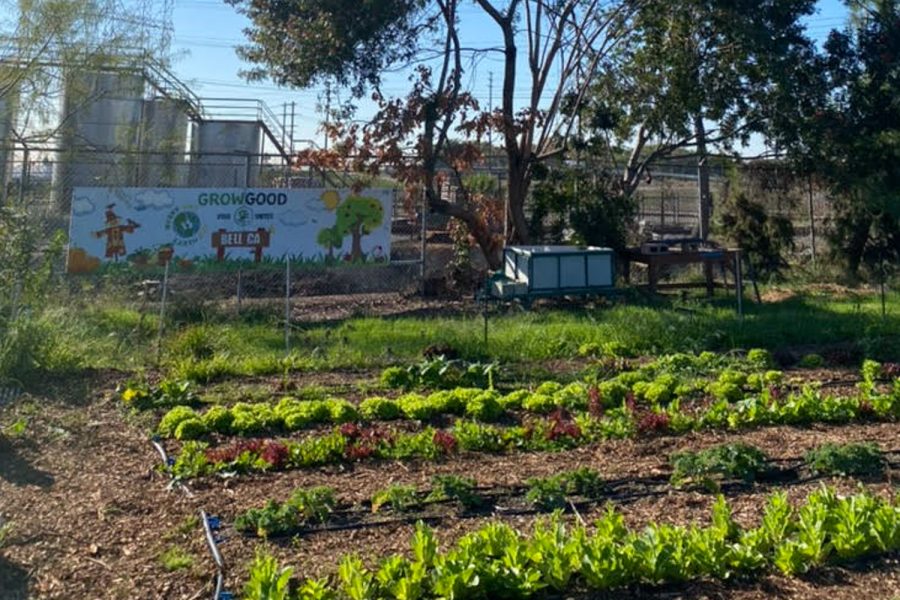Global South leads fight for climate justice; Archer students follow
Photo credit: Eliza Tiles
Crops grow at GrowGood, an urban farm located in Los Angeles. Senior Eliza Tiles has been volunteering at GrowGood since she returned from working on an urban farm in Maine. Urban farms help provide communities with sustainable ways of eating and can reduce outside temperatures, an effect of climate change.
January 8, 2023
Regardless of political party, U.S. citizens largely agree that climate change is one of the most pressing issues in today’s world. According to Pew Research, 67% of U.S. adults say that the federal government is not doing enough to reduce the effects of global climate change.
Global average world temperatures have already led to the displacement of wildlife and will lead to the displacement of millions of humans. Average world temperatures have risen by about one degree Celsius since 1880. If global consumption rates continue at the predicted rate by 2050, average world temperatures are projected to rise by 1.5 degrees Celsius, and by 2100, two to four degrees Celsius.
The U.S., an economic superpower, emits the second most amount of greenhouse gasses of any of country. Developed superpowers like the U.S. will be exponentially less affected by the effects of continued global warming compared to countries in the Global South, which homes the majority of the world’s population.
Brazil’s leftist President Luiz Inácio Lula da Silva, commonly referred to as Lula, is a leader at the forefront of the climate crisis. Lula was sworn-in to office Jan. 1, and has attended the Conference of the Parties of the United Nations Framework Convention on Climate Change (COP 27). Since his presidential election, he has led the unified action to conserve rain forests in Brazil, the Congo and Indonesia, which make up half of the world’s rainforests.
“Lula is an important stepping stone for the climate. You’ve got a country with a large economy with a president who is probably more environmentally conscientious than any other president in the world,” history teacher Nicholas Graham said. “He is this globally renowned, very charismatic figure — hugely energetic. I think that he articulates an awful lot of what a lot of people in the Global South feel. He’s able to state very clearly how the world works and the fact that there is injustice in the world. We in the north aren’t doing enough to arrest and address a problem that is going to adversely impact or disproportionately impact the people living in the Global South.”
Archer offers a sustainability course to the upper school, which focuses on learning about and analyzing climate change from different lenses and how sustainability combats global warming.
Senior Eliza Tiles is currently enrolled in the course and said having a structural approach to learning about environmentalism and sustainability has deepened her understanding. She currently volunteers at Grow Good, a sustainable urban farm in Ballard, California. Tiles spent a semester of her junior year living and working on a sustainable farm in Maine.
“It is important that the U.S. take a strong stance because we are definitely trend-setters, and we also are really, really big emitters. There’s so many countries that the populations are affected much more than we can even fathom. We are talking about the displacement of millions os people,” Tiles said. “It’s important to write to your congressman. Even our mayor here in L.A., Karen Bass, we have to hold accountable now that she was just elected and reach out to your representatives and tell them that you care. With the climate, it’s really all about the young people.”
Sustainability, Environmental and Outdoor Education Specialist Casey Huff, who teaches the sustainability course, said she places a big focus on intersectionality and how women’s empowerment, women’s equality, racial equality and environmental racism all intersect with sustainability.
“I believe lived experience comes through education and through exposure to sobering truths and statistics about places like Africa and other places in the Global South. I believe information and awareness is really important.,” Huff said. “Secondly, I don’t think that the United States needs to swoop in and exhibit a lot of white saviorism. It needs to be a collaborative effort to attack climate change, and what might work and what might be a reality for a place in the Global South might look different here, but we all need to agree upon a common goal. I think that everybody should be given the tools and the autonomy to make decisions for their region, their neighborhood, their country as they see fit.”
Senior Olivia Torrington joined Youth Climate Strike LA this past summer and is a part of a group of just under 20 people. Their most recent strike took place Friday, Sept. 23, where youth gathered in Downtown, Los Angeles to call on elected leaders to take action against environmental injustices, which they believe disproportionately impact communities of color and people experiencing poverty.
“It is a lot of political lobbying, talking to local L.A. reps and trying to provide for our community and serve and work for fight for climate justice on that local level,” Torrington said. “We are holding events like marches and having different speakers at our events. We’ve had art builds, rallies and it’s also a lot of working with a lot of other organizations.”
Senior Margaret Morris works with Youth for Ecocide Law, a branch of Stop Ecocide International, that is fighting to make the crime of Ecocide a part of the International Criminal Court. Morris said because the U.S. is not part of the International Criminal Court, U.S. leaders do not feel as much of a responsibility to support other countries that are bearing the brunt of climate change.
“We see countries in the Global South where world leaders are making speeches literally halfway in the water. It really enforces the urgency of the situation and shows that Ecocide needs to be established as an international crime,” Morris said. “A way to remedy the blindness to that the U.S. suffers from would be getting involved as much as possible in terms of education and talking to people. If you can, talk to people from all over the world because in talking to people who live there and who are fighting for justice, you realize the breadth of the climate crisis.”










